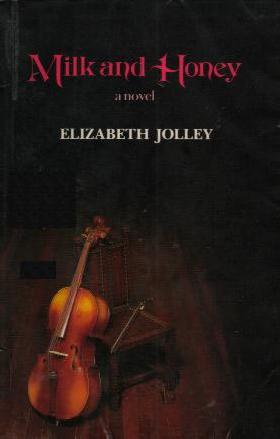 It’s such a shame that Elizabeth Jolley’s works are quite difficult to find and that she has become somewhat obscure. Except for The Well, not many of her other writing are published. Some of her titles are being republished by Penguin Modern Classics with beautiful new covers but I haven’t seen many, if any, of them in stores.
It’s such a shame that Elizabeth Jolley’s works are quite difficult to find and that she has become somewhat obscure. Except for The Well, not many of her other writing are published. Some of her titles are being republished by Penguin Modern Classics with beautiful new covers but I haven’t seen many, if any, of them in stores.
I don’t know why I decided to reserve Milk and Honey from my library when I saw it on the list. The title is indeed quite intriguing and the story rather bizarre. The story is narrated by Jacob, also known as Jackyboy by his lover Madge, who we know from the beginning is dead. He makes his living as a failing door-to-door salesman, trying to etch out a life in a dreary town, in a dreary little house, with his silent and exhausted wife and young daughter. Their lives are only slightly cheered every Sunday when a family friend, who we later find out is Madge’s widower, visits although Jacob is irritated by Norman. Jacob’s hands are also hideously disfigured and he recounts what his life was once was.
Coming from an immigrant family, Jacob is sent to board at a music teacher and his family’s house when Jacob is around fourteen. The family, lead by the elderly Leopold, originate from Austria. The large, run down house is also inhabited by Leopold’s two sisters, the stern Tante Rosa and aunt Heloise. There is also Leopold’s teenage daughter Louise and son, Waldemar. Waldemar likes to play harmless jokes on Jacob, is heavily spoilt by his family and loves sweet biscuits, milk and honey. Louise and Jacob bond but he is still being constantly teased by Waldemar. At the urgings of Leopold, Tante Roas and aunt Heloise, Jacob finally gives Waldemar a whack on the chest from which the overweight Waldemar promptly dies from. To Jacob’s surprise, the family loves Jacob all the more for it and treats him as a hero and not a murderer. With this hanging on Jacob’s conscience, he throws himself what he loves best – playing the cello.
When I played the cello and the cello hesitated, poised on a single note so pure and restrained and lovely I closed my eyes with an exquisite love of the cello. I was in love with the cello. – p. 35
Kept isolated in the house and living and breathing music, Jacob passes his teenage years. The only times he ventures outside is to accompany Leopold on his weekly trips to the local psychiatric hospital where he plays the piano for the women’s ward. Jacob also begins to play with an orchestra where he meets Madge who, although Jacob does not realise this for some time, represents freedom and the life he has missed out on. When Jacob’s father suddenly dies Jacob inherits his father’s small wealth. He also quickly becomes engaged to and marries Louise. Without any action on Jacob’s part, he has been entirely consumed by the household.
In spite of spending my afternoon resting and planning ways in which I could enjoy my new freedom, I felt tied into the house, joined to the people by invisible cords. It was by their acts of kindness they imprisoned me. As a boy I had only to call out in a dream and Tante Rosa was immediately beside my bed to comfort me. Leopold was devoting himself to my music lessons. And, I was, without any effort on my part, engaged to Louise. I wanted all that I had, but I wanted something else as well. – p. 57
Jacob begins an affair with Madge and attempts to loosen his ties to the house which is now near impossible. He soon discovers, but refuses to believe, that Waldemar is still alive after all and has been living on the top floor of the house from which Jacob has always been forbidden. Another twist comes when Louise, the timid and obedient girl, reveals she is pregnant soon into the marriage even though she and Jacob failed to have sex on their wedding night.
Milk and Honey is a very quiet book and yet it is constantly filled with tension. Elizabeth Jolley effortlessly evokes the heavy, stifled atmosphere and pushes the reader gently along. That Waldemar has an undisclosed mental impairment is never loudly revealed but Jolley gently guides the reader to realisation. I love that the house is featured as a supporting character. The Leopold family remains mysterious, particularly Louise who remains a silent figure going about the daily drudgery of life having never quite lived. The title, of course, refers to how one can catch a bee more easily with honey than with a trap. None of the characters, except Leopold, were particularly likeable. Jacob himself was quite self absorbed but who can really blame him after spending his formative years virtually a prisoner?
‘All whom I held in my arms did not remain
but you are reborn again and again:
because I never held you, I hold you for ever.’
“You don’t love anyone except yourself Jacob. You don’t want the words to sing for me Jacob. You want them for someone else.” – p. 164
